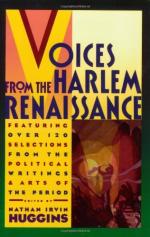
|
| Name: _________________________ | Period: ___________________ |
This test consists of 15 multiple choice questions and 5 short answer questions.
Multiple Choice Questions
1. Whose idea was that the Negro race is part of a greater destiny?
(a) Hurston.
(b) Hughes.
(c) James Weldon Johnson.
(d) Toomer.
2. Who is the author of the poem "Conception"?
(a) Hughes.
(b) Cuney.
(c) Hurston.
(d) Cullen.
3. According to Hughes, what does he find to be a subconscious belief in most Negro homes?
(a) To be white means power.
(b) To be white means wealth.
(c) That they are inferior to whites.
(d) To be white is better.
4. What does the mother mean when she tells her son to "not act like a nigger" in the essay by Hughes?
(a) To misbehave.
(b) To act rich.
(c) To act right.
(d) To not act poor.
5. What technique does Hurston discuss in "Spiritual and Neo-Spiritual"?
(a) The technique to conjure spirits.
(b) The technique of sounds production.
(c) Breathing in songs and sermons.
(d) Diction.
6. Who is the author of "The Negro-Art Hokum"?
(a) George Shultz.
(b) Geroge Smith.
(c) Shuylee.
(d) George S. Schuyler.
7. What is the title of the essay by Langston Hughes that delves into the racial stumbling block Negro artists face?
(a) "The Negro Artist and the Racial Mountain".
(b) "The Race and the Artist".
(c) "The Artist and its Race".
(d) "The Race to be an Artist".
8. Why do Negroes mimic according to Hurston?
(a) For money.
(b) To feel better.
(c) For the fun; not to be like others.
(d) To be like others.
9. What animal remains by Aunt Judy Bickerstaff in "Uncle Monday" until she begins to doubt herself?
(a) An alligator.
(b) A crocodile.
(c) A snake.
(d) A giraffe.
10. How does the section "Art and Propaganda" end?
(a) With an essay.
(b) With 2 interviews.
(c) With 2 songs.
(d) With 2 poems.
11. According to "Our Greatest Gift to America", where do Negroes frequently spend their time?
(a) Bars.
(b) Clubs.
(c) Libraries.
(d) Parks.
12. What does the author of "Go Down Death" describe the poem as?
(a) A monologue.
(b) An apology.
(c) A funeral sermon.
(d) A soliloquy.
13. Who is the author of "Sterling Brown: The New Negro Folk Poet"?
(a) Hurston.
(b) Domingo.
(c) Locke.
(d) Hughes.
14. What type of music is in "The Banjo Player"?
(a) Classical.
(b) Blues.
(c) Music of peasant people.
(d) Bluegrass.
15. How does Hurston originally define the word "jook"?
(a) A type of person.
(b) A song.
(c) A food.
(d) A bawdy house.
Short Answer Questions
1. How many facts does the author present in "The Negro Digs Up His Past"?
2. What does the author of "The Negro Digs up His Past" attribute his ideology to?
3. What term is coined to mean that African Americans do not produce art specific to their race due to the absorption of American ways?
4. What is the name of the host and novelist in Thurman's story?
5. What does Cullen seem to indicate about heaven in her poem "She of the Dancing Feet Sings"?
|
This section contains 472 words (approx. 2 pages at 300 words per page) |

|




